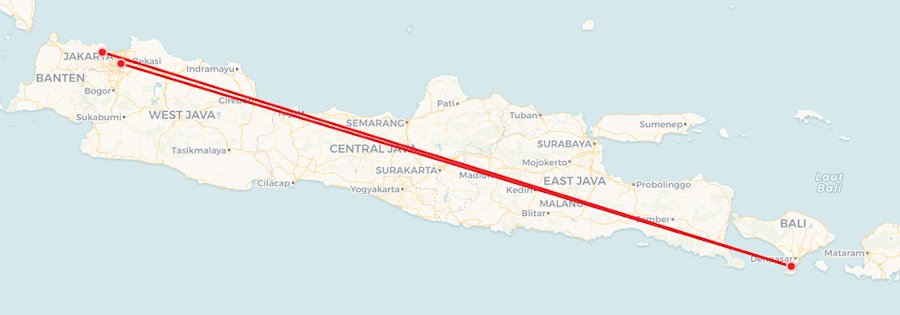Travel Notes: Destinations: Asia: Indonesia - Bali Travel Guide > Bali Tours & Trips.
Short URL: https://tnot.es/DPS
Travel Guide For Visitors to Bali
From world-class wellness retreats in Ubud to sophisticated beach clubs in Seminyak, the island of Bali offers spiritual enlightenment or a proper good time. Share on Facebook
Bali Has Evolved
This Indonesian island has evolved far beyond its reputation as a backpacker haven.
 Add a Business -
Add a Location -
Add a Lodging - Add Travel Content
- Add URL
- Travel Services.
Add a Business -
Add a Location -
Add a Lodging - Add Travel Content
- Add URL
- Travel Services.
Bali is Beyond Beautiful
Painting The Picture
Emerald rice terraces cascading down volcanic slopes, ancient temples perched on dramatic clifftops, and beaches that stretch endlessly into turquoise waters.
Welcome to Bali, where every corner tells a story and every sunset paints the sky in impossible colours.
Essential Travel Information for Bali
Visa Requirements and Entry
Getting into Bali has become refreshingly straightforward.
Most visitors can choose between two main options.
Visa on Arrival (VOA)
Available for 30-day stays at US$35 (approximately £28), this single-entry visa can be extended once for an additional 30 days.
You can apply for an e-Visa on Arrival (e-VOA) online at least 48 hours before travel, which speeds up the airport process considerably.
Visa-Free Entry*
Citizens of many countries can enter for up to 30 days without a visa, though this option cannot be extended.
Important Requirements
Passport validity of at least 6 months from entry date.
Return or onward ticket.
SATUSEHAT Health Pass electronic self-declaration form.
An IDR 150,000 tourism levy (approximately £8) was introduced in February 2024.
Best Time to Visit Bali
Bali's tropical climate means you can visit year-round, but timing affects your experience dramatically.
Dry Season (April-October)
Perfect weather for beach activities and temple hopping.
Expect clear skies, minimal rainfall, and comfortable temperatures around 26-30°C.
This is peak season, so accommodation prices rise accordingly.
Wet Season (November-March)
Don't let the name put you off.
Rainfall typically comes in short, heavy bursts rather than constant drizzle.
You'll find fewer crowds, better prices, and the landscape at its most lush and green.
Shoulder Seasons
April-May and September-October offer the sweet spot of good weather with fewer tourists.
Jakarta to Bali
Click Image to Modify Travel Plans
Where to Stay in Bali
Canggu - Surfer's Paradise with Hipster Vibes
Once just a sleepy fishing village.
Canggu has evolved into a laid-back surf town with excellent waves, trendy cafés, and a thriving digital nomad community.
The rice paddies provide a stunning backdrop to beach life, creating a unique blend of rural and coastal experiences.
Best for surfers, digital nomads, and budget-conscious travellers.
Kuta Beach
Kuta Beach was among the first places in Bali to develop a substantial tourism infrastructure.
It is also known as a good place to enjoy sunsets, with options to relax on the sand with bean bags and sip cold drinks, making it a lively urban beach setting.
The Kuta Beach Hotel offers a rooftop infinity pool, just a minute's walk from the beach.
Some might consider Kuta as over-hyped and overcrowded, and even sonething of a tourist trap.
Nusa Dua - Luxury Resort Enclave
The purpose-built resort of Nusa Dua offers pristine beaches, championship golf courses, and five-star accommodations.
While it lacks the authentic Indonesian character found elsewhere, it provides a polished, hassle-free experience with world-class facilities.
Best for luxury seekers, golf enthusiasts, and those seeking resort-style holidays.
Sanur - Peaceful Family-Friendly Retreat
Sanur offers a more gentle introduction to Bali life.
The beaches here are protected by coral reefs, creating calm waters perfect for swimming and snorkelling.
The atmosphere remains decidedly low-key, with traditional warungs (local eateries) outnumbering trendy restaurants.
Best for families, older travellers, and those seeking tranquillity.
Seminyak - Sophisticated Beach Living
Seminyak has transformed into Bali's most stylish destination.
The beach clubs here rival anything in Ibiza, while the dining scene showcases both innovative international cuisine and elevated Indonesian dishes.
It's where you'll find designer boutiques, high-end spas, and some of the island's most Instagram-worthy sunset spots.
Best for luxury travellers, beach club enthusiasts, and couples seeking romance.
Ubud - Cultural Heart and Wellness Haven
Nestled among rice paddies and tropical rainforest, Ubud offers a completely different Bali experience.
This is where you'll find yoga retreats, traditional art markets, and some of the island's most important temples.
The cooler mountain air provides welcome relief from coastal humidity.
Best for wellness seekers, culture enthusiasts, and solo travellers.
Tourist Map of Bali
Use the Tourist Map of Bali to help you decide where to stay in Bali based on travel budget, preferred location, planned must-see attractions and local must-do activities.
Top Attractions and Experiences
Ancient Temples and Sacred Sites
Besakih Temple
Known as the 'Mother Temple', this vast complex on the slopes of Mount Agung represents the spiritual heart of Balinese Hinduism.
The journey here takes you through stunning mountain scenery.
Tanah Lot Temple
This iconic sea temple, perched on a rocky outcrop, ranks among Bali's most photographed landmarks.
Visit during late afternoon for spectacular sunset views, but expect crowds during peak season.
Uluwatu Temple
Situated on a cliff 70m above the sea, this extensive temple complex is the second most visited attraction in Bali, after Tanah Lot.
The traditional Kecak fire dance performances here are mesmerising.
Adventure Activities
Diving and Snorkelling
The waters around Nusa Penida and Menjangan Island offer world-class diving, with opportunities to spot manta rays, whale sharks, and colourful coral gardens.
Volcano Trekking
Beyond Mount Batur, experienced hikers can tackle Mount Agung, Bali's highest peak and most sacred mountain.
The challenging overnight trek rewards climbers with sunrise views across the entire island.
White Water Rafting
The Ayung River near Ubud offers thrilling rapids surrounded by stunning tropical scenery.
Most tours include equipment, lunch, and hotel transfers.
Cultural Experiences
Balinese Cooking Classes
Learn to prepare authentic Indonesian dishes using traditional techniques and local ingredients.
Many classes include market visits and provide recipe cards to recreate the dishes at home.
Sacred Monkey Forest Sanctuary, Ubud
This nature reserve houses hundreds of monkeys that freely roam among forested temples.
While touristy, it offers genuine insights into Balinese Hindu culture and the relationship between humans and nature.
Traditional Markets
Ubud's morning market provides an authentic glimpse into local life, with vendors selling everything from exotic fruits to handwoven textiles.
Bargaining is expected, and part of the fun.
Natural Wonders
Jatiluwih Rice Terraces
These UNESCO World Heritage-listed terraces showcase Bali's ancient subak irrigation system.
The endless green steps create a mesmerising landscape that changes with the seasons.
Mount Batur Sunrise Trek
This active volcano offers one of South-east Asia's most rewarding sunrise experiences.
The pre-dawn hike is challenging but manageable, and you'll be rewarded with breathtaking views across the caldera lake.
Sekumpul Waterfall
Often called Bali's most beautiful waterfall, Sekumpul requires a bit of effort to reach but delivers spectacular results.
The multi-tiered cascade tumbles through lush jungle, creating natural swimming pools.
Food and Dining
Bali's culinary scene has exploded in recent years, offering everything from street food adventures to fine dining experiences that rival any global food capital.
Dining Experiences
Beach Club Dining
Seminyak's beach clubs offer international cuisine with Indonesian influences, served in stunning oceanfront settings.
Expect to pay resort prices but enjoy world-class presentation.
Fine Dining
Ubud and Seminyak now host restaurants that would earn recognition in any major city.
Many focus on locally sourced ingredients and modern interpretations of traditional dishes.
Warung Hopping
These family-run local eateries serve authentic Indonesian food at incredibly low prices.
Look for places busy with locals; they know where to find the best food.
Must-Try Local Dishes
Bebek Betutu
Slow-roasted duck stuffed with traditional spices and wrapped in aromatic leaves.
This ceremonial dish requires hours of preparation but delivers incredible depth of flavour.
Gado-Gado
This Indonesian salad combines blanched vegetables, tofu, tempeh, and boiled eggs with a rich peanut sauce.
It's healthy, filling, and bursting with flavour.
Nasi Goreng
Indonesia's national dish of fried rice comes in countless variations.
The best versions include kecap manis (sweet soy sauce), fresh vegetables, and a perfectly fried egg on top.
Sate Lilit
Bali's unique take on satay uses minced meat mixed with coconut, spices, and herbs; wrapped around lemongrass stalks, instead of wooden skewers.
Practical Travel Tips
Cultural Sensitivity
Bali remains deeply spiritual, so dress modestly when visiting temples (covered shoulders and knees). Remove shoes before entering sacred spaces, and don't point your feet toward altars or religious statues.
Getting Around
Motorbike Renta
The most flexible way to explore Bali, but requires confidence navigating chaotic traffic.
International driving permits are mandatory, and helmets are required by law.
Private Driver
Hiring a driver for day trips or longer periods offers comfort and local knowledge.
Expect to pay around £25-40 per day, and many drivers become informal tour guides.
Ride-Hailing Apps
Grab and Gojek operate in main tourist areas, offering convenient and affordable transportation with fixed prices.
Health and Safety
Bali is generally safe for tourists, but standard precautions apply.
Drink bottled water, use mosquito repellent, and ensure travel insurance covers adventure activities.
Private healthcare is excellent in main tourist areas.
Money Matters
Indonesian Rupiah (IDR) is the local currency.
ATMs are widely available, but notify your bank of travel plans to avoid card blocks.
Many tourist businesses accept US dollars, but you'll get better rates paying in rupiah.
Shopping and Souvenirs
Modern Shopping
Seminyak Boutiques
High-end fashion and lifestyle stores showcase both international brands and local designers.
Ubud Markets
Perfect for handmade crafts, textiles, and artwork.
Bargaining is expected; start at about 30% of the asking price.
Traditional Crafts
Batik
These intricate hand-dyed fabrics make beautiful clothing, bags, and home decorations.
Ubud's markets offer the best selection and quality.
Silver Jewellery
Celuk village is renowned for intricate silver work, creating both traditional and contemporary designs.
Wood Carvings
Mas village specialises in traditional woodcarving, producing everything from small decorative items to elaborate sculptures.
Sustainable Travel
As Bali faces significant environmental challenges from overtourism, consider responsible travel practices.
Choose locally owned accommodations and restaurants.
Learn about local customs and traditions to show respect for Balinese culture.
Refuse single-use plastics and bring a reusable water bottle.
Respect marine environments when snorkelling or diving.
Support ethical wildlife experiences that prioritise animal welfare.
Planning Your Bali Adventure
Whether you're seeking spiritual enlightenment in Ubud's temples, riding perfect waves in Canggu, or sipping cocktails at Seminyak's beach clubs, Bali offers experiences that will exceed your expectations.
The island's unique blend of ancient traditions and modern amenities creates a destination unlike anywhere else in South-east Asia.
Start planning your adventure with realistic expectations about crowds and commercialisation in popular areas, but don't let that deter you.
Venture slightly off the beaten path, engage with local culture respectfully, and prepare for an island that will capture your heart.
The magic of Bali lies not in any single experience but in the way the island weaves together stunning natural beauty, rich cultural heritage, and warm hospitality to create memories that last a lifetime.
More City Travel Guides
Cities in Africa - Cities in America - Cities in Asia - Cities in Australasia - Cities in Latin America - European Destinations - Middle East.
More From Travel Notes
Travel Notes Online Guide to Travel
Africa - Asia - Caribbean - Europe - Middle East - North America - Oceania - South America.
The Travel Notes Online Guide to Travel helps visitors plan their trip with country and city travel guides, local tourist information, reviewed web sites, and inspiring travel content.
Travel and Tourism Guides on Travel Notes
 If you find Travel Notes useful, please take a moment to
like us on Facebook and share with your friends on social media.
If you find Travel Notes useful, please take a moment to
like us on Facebook and share with your friends on social media.
Share on Facebook
Travel Resources
.
Travel & Tourism With Industry Professionals.















